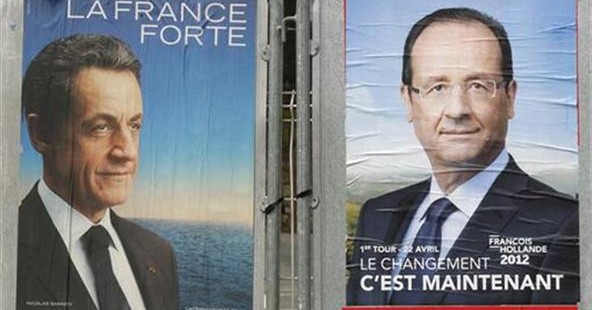
What a Socialist France Would Mean for America
Should the U.S. be (a) frightened, (b) neutral or (c) exuberant that a very moderate Socialist looks set to win the presidency in France when the second round of voting takes place May 6? If Francoise Hollande wins, Americans should applaud. Why? Hollande’s arrival in Élysée Palace would mark the beginning of the end of the rigorous austerity policies that have pushed Europe to the brink of depression and made the Continent a drag on U.S. growth and a threat to its frail recovery.
Hollande’s victory in the first round of voting last week seems to have arrived as some sort of lightning bolt. The conversation appears since to have changed—certainly in Europe, but also in the U.S., which has been pursuing a modified version of Europe’s strategy. Austerity policies without offsetting measures to stimulate demand simply do not work. Only the heretics (and I confess to being one) were willing to make this perfectly obvious observation over the last couple of years. Now you hear it in European capitals as well as in our own.
Last week some of Europe’s biggest guns called for a new balance of budget cuts and stimulus. Mario Draghi, the president of the European Central Bank, offered his support for Hollande’s proposed “growth compact” that would cover all E.U. members. A day later Mario Monti, Italy’s prime minister, came out strongly against austerity-only policies to which he had acquiesced just a few weeks ago.
The unspoken part of the story concerns Germany. As Europe’s leader now, Germany has held fast to stiff austerity policies for its southern neighbors. It has been odd this past week to listen to European leaders such as Draghi and Monti and note that they avoid mentioning German Chancellor Angela Merkel at all costs. But Merkel has surprised everyone by changing her tone. There will be no showdown between Paris and Berlin if Hollande is elected. In a nod to Hollande’s proposal, Merkel said she saw plenty of room for compromise between policies focused on structural reform and tax-funded stimulus.
What is Hollande’s program and what will it mean for the U.S.? Hollande argues for a renegotiation of the European fiscal pact completed and signed last December for two reasons. He wants the pact to authorize the issue of common European bonds—not to pay down bank debt but to finance growth via investment in such sectors as renewable energy, education, and urban development. So he’s solidly European, even if he sings in a different key.
Second, he wants to incorporate some form of “Tobin tax” –a levy on financial transactions. This has been in the wind for years. Given that even Merkel now favors such a tax, it seems inevitable, even though nobody knows yet what it would be or how it would work. Other planks in Hollande’s platform include higher taxes on wealth in France and a balanced budget.
We have to see how a Hollande presidency is received in Europe before we can assess the American reaction. Some European officials said last week that it could spark a fundamental move leftward in numerous European capitals. That’s a real possibility, given that social democratic parties are large and have been frustrated a long time because their constituents are most affected by austerity policies.
If you accept that carefully crafted growth policies are the fastest way to get Europe back on its feet, then you have to conclude that a Hollande victory on May 6 could prove good news for Americans and American companies. Europe is a stone around the world economy’s ankle. Given the American economic report released Friday—U.S. growth slowed to 2.2 percent in the first quarter—the obvious conclusion is that in a fully globalized, interdependent economy, no part of it can grow swiftly and consistently if roughly a third of it is tanking.
Ford Motor Company had an interesting first-quarter report last week. It illustrates the point. North American operations rose 16 percent, to $2.1 billion in the January–March period. In Europe Ford lost $149 million, primarily due to the recession and higher taxes.
Ford’s story is the U.S. corporate story in Europe. If I were sitting in the corner office, I would rather see taxes adjusted upward in an environment of steady economic growth and strong markets. One cannot go around bragging about low tax rates if there is no demand—and hence no revenue to tax.
The best thing to come out of a Hollande presidency would be a more diverse conversation about economic policies. For too long it has been like an ideological crusade: Cut spending and do not worry about stimulus or jobs. Even now, we see resistance in the markets. With basket cases such as Spain in the news—its jobless rate is now hovering at a 25 percent—we need new ideas, thinking that combines fiscal and budgetary discipline with humanity and concern for the common weal.

